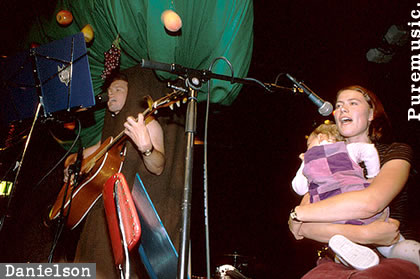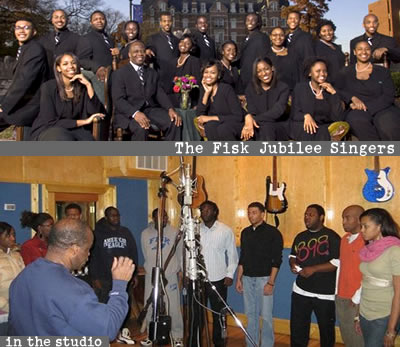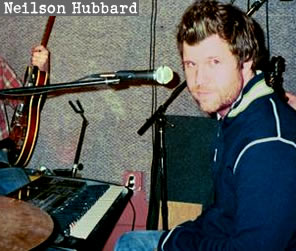
A Conversation with David Macias
(continued)
DM: We really tried to be egalitarian, too, and I hope that we were. And it was nice, the first Amazon review that we got from a consumer lauded us for this--we really tried to tell many people's stories, whether it was a story that we personally agreed with or not. They made the comment on the album that Janis Ian's track, " Johnny I Hardly Knew Ye," is just an incredibly powerful anti-war song from the Civil War era, but so is "Dixie's Land"--and a very wistful "Dixie's Land."
PM: Right. It wasn't tongue-in-cheek, it wasn't ironic. It was just straight ahead. [There's a video on YouTube now that shows the recording of three songs for this album, among them "Dixie's Land."]

DM: Right. We wanted to have songs from various political viewpoints. We wanted to include songs that evoked faith, and songs that didn't necessarily have anything to do with faith. We really wanted to try to cover as much ground as possible and not have it be something that was going to lean to the left or to the right, or to try to tell any particular story or tell it in a slanted way. Although, I have to say, in certain eras it was difficult. We couldn't find any songs that had anything to do with--we couldn't find any pro John D. Rockefeller songs, for instance. So probably when we're around that era, there's a little bit of a slant towards like labor and farmers and things like that. But nobody seemed to be writing songs about Rockefeller, so it was difficult to find one.
[laughter]
PM: It's amazing they weren't commissioned to do so.
DM: But those guys probably had so much money they just didn't care.
PM: Yeah, right. Songs are for poor people.
[laughter]
PM: So with 50 tracks and that many artists involved, maybe there's a couple of good stories connected with either how the artists were secured, or how the recordings were achieved.
DM: Let's see, some of my favorite stories... I'll just share with you some of my personal memories from putting this together. One of my favorites was the artist Jake Shimabukuro, who is called the "Jimi Hendrix of the ukulele."
PM: So amazing. [Jake is also coincidentally reviewed in this issue.]
DM: Yeah. And when I talked to him about this project--we work with him, we distribute and market his projects through Thirty Tigers. Anyway, so he was in town, and we were down at 12th & Porter, and I was talking about this project. And he basically went and grabbed his ukulele and just cut loose on "Stars & Stripes Forever."
PM: [laughs]
DM: And that was the first time I'd ever heard him do it, and it was just like, "Oh, my God!"

PM: He's so incendiary. He's so out this world.
DM: Yeah. So that was a literally hair-raising moment.
PM: I've been trying to land an interview with him. I can see now that you're my fulcrum there.
DM: Yes. I likely am.
PM: Okay, beautiful.

DM: Another one. Ed produced the track, but I hung around just because he's so cool. But being in the studio with Devendra Banhart was really great, really thrilling.
PM: He casts an interesting spell.
DM: Yeah. Oh, yeah, definitely. I just think he's a totally unique--he's just cool. He's just cool. So that was a lot of fun.
PM: What's he like as a guy? Did you hang with you him at all?
DM: I was in the studio, hanging around, I conversed with him a little bit, but it wasn't like we got to know each other or anything like that. But he was an incredibly sweet guy. I know some people who sort of espouse "peace and love"--well, I guess for better words, I sound like an old person when I say this, but that sort of hippie kind of lifestyle--
PM: Sure.
DM: Some people espouse that but aren't quite so loving in reality. But he seemed like a very loving guy.
PM: Oh, that's nice to hear. Yeah, because there are a lot of people throwing up the peace sign that aren't too nice when you get up close.
DM: Right, exactly, exactly.

And being in the studio with the Fisk Jubilee Singers was just unbelievable. And that took a lot of work. They're students, and Paul Kwami, their director, has to make sure to take care of that in terms of scheduling things. It took a long time to work our schedules together where we could get them and the studio all at the same time. But I just really wanted to have them on there, so we just worked it all out.
There are just so many moments. And one of the other special moments that's more on a personal level, of course, my wife, Judith Edelman is, I think, incredibly brilliant. Her track was a collaboration with Neilson Hubbard. And I just remember when she brought it home and we were listening to it, it was just like--I get a little choked up even thinking about it now. To me it's just such a beautiful track, and the fact that she--
PM: It was a beautiful piece of work.
DM: Yeah.
PM: It was nearly as momentous and in the same category as the song that she cut for the Steven Foster tribute, which I thought was, flat out, the best track on that record. [You can hear a clip of that song and several others from Beautiful Dreamer on our Listen page #22.]

DM: Yeah. Yeah, I think so. I absolutely love that track on the Foster record, but this, to me, is just a lot more cinematic, and I think that with--her voice can be very fragile and tender, and when she sings the line about "weary folks find rest" in "Sleep, My Child," it's just so incredibly beautiful and heartfelt. She really pulls an emotion out of that song. I can't imagine there being too many more soulful versions of that song.
PM: Yeah, I'd never heard it before. But it was a spectacular track. And I thought that Judith and Neilson Hubbard was a beautiful pairing on that track.
DM: Yeah, definitely.

print (pdf) listen to clips puremusic home